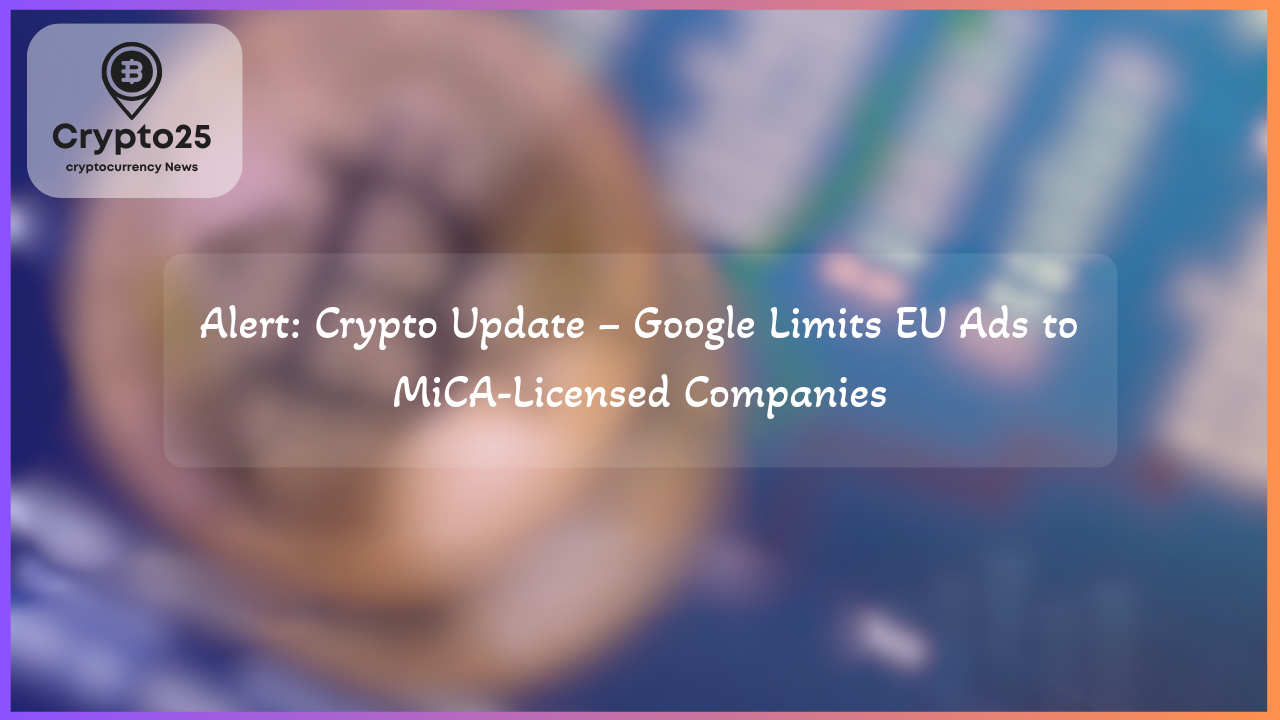
The crypto advertising landscape in the European Union is undergoing significant changes, with Google implementing stricter policies tied to the EU’s new Markets in Crypto-Assets (MiCA) regulation. Starting April 2024, cryptocurrency exchanges and software wallet providers will only be able to promote their services if they have the appropriate license under MiCA. This move signals a major step toward greater regulatory oversight in the region’s crypto market.
## Google Aligns Crypto Advertising Rules with MiCA Regulation
Google’s updated policies are a result of the EU’s comprehensive MiCA framework, which aims to standardize crypto regulations across all 27 member states. Starting April 23, 2024, crypto advertisers must secure a certification from Google, demonstrating compliance with MiCA by registering as a Crypto-Asset Service Provider (CASP). Beyond obtaining this necessary certification, advertisers are also required to adhere to additional country-specific legal obligations that might exist.
The implementation of MiCA symbolizes an evolution from the fragmented national licensing systems that previously governed cryptocurrency advertising in Europe. By streamlining regulations under a unified framework, MiCA seeks to enhance investor protection and ensure greater transparency within the cryptocurrency industry. These stringent advertising requirements could reshape how crypto firms operate in Europe’s competitive market.
## Temporary Measures for Existing Advertisers
While complying with MiCA is mandatory, Google has introduced temporary measures for crypto platforms currently operating in specific European countries such as France, Germany, and Finland. Under existing local laws, advertisers will be permitted to use their existing national licenses to continue promoting their services. These licenses will remain effective until mid-to-late 2025, aligning with the MiCA transition timeline for each country.
During this transitional period, crypto platforms in these regions have a unique opportunity to adjust their operations and secure MiCA compliance without an immediate impact on their advertising efforts. This leniency highlights Google’s acknowledgment of businesses that operated under legal guidelines prior to MiCA’s rollout, fostering a smoother regulatory shift for the industry.
Google also clarified that accounts found non-compliant after April 2024 will not face immediate suspension. Instead, the company will issue a warning at least seven days before taking enforcement action, giving platforms a final chance to address regulatory gaps. This move underscores the tech giant’s attempt to balance regulatory enforcement with flexibility for advertisers.
## Major Crypto Platforms Already Embracing MiCA Compliance
Several leading cryptocurrency exchanges have already taken proactive steps to secure MiCA licenses, positioning themselves for continued growth in the EU market. Companies such as Crypto.com, OKX, eToro, Bitpanda, Boerse Stuttgart Digital, and others are leading the charge, aligning their practices with MiCA requirements ahead of the April deadline. These efforts underscore their commitment to regulatory compliance and ensure they remain competitive in one of the world’s largest crypto markets.
MiCA compliance not only allows these platforms to advertise within the EU but also strengthens consumer trust and promotes legitimacy within the broader crypto ecosystem. Operating under a standardized framework enhances transparency, reduces risks associated with unregulated platforms, and contributes to the maturation of the digital asset industry.
## EU Crypto Market Outlook Under MiCA
The MiCA regulation has far-reaching implications for the European crypto market. By creating a uniform set of rules, it aims to eliminate market fragmentation and boost investor confidence in regulated crypto services. This regulatory clarity is expected to attract more institutional investment into the sector, further solidifying Europe’s position as a leader in blockchain and digital asset innovation.
| Title | Details |
|---|---|
| Market Cap | $1.2 Trillion |
For advertisers, adapting to these changes will require agility and innovation to meet the growing demand for compliance without compromising marketing strategies. Google’s enforcement of MiCA-based policies reaffirms the increasing integration of cryptocurrencies into the global financial system, albeit under tighter scrutiny from regulators. As the April 2024 deadline nears, the crypto ecosystem must prepare for this regulatory shift to maximize opportunities and foster sustainable growth.
